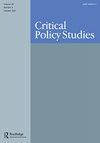‘Close but not too close’ – experiences of science-policy bridging in three international advisory organizations
IF 2.4
3区 社会学
Q1 Social Sciences
引用次数: 4
Abstract
ABSTRACT The role of science in environmental decision-making calls for an improved understanding of how scientific advice can best inform policy. Policy-relevant science is trapped in the conundrum of being close to policy and politics while trying not to become too close, to avoid politicization. We investigate this dilemma in three scientific advisory organizations: the International Council for the Exploration of the Sea (ICES), the Intergovernmental Panel on Climate Change (IPCC), and the Intergovernmental Science-Policy Platform on Biodiversity and Ecosystem Services (IPBES). Comparing marine, climate, and biodiversity governance at the international level, we reveal how the science-policy interface is understood and arranged in the institutional designs of these organizations. While they are all mandated to be policy-relevant, they aim to provide a neutral space for science that is not overtly impacted by politics. Our analysis reveals key differences in science-policy interactions regarding four issues: mandate; science-policy separation; politicization of advisory science; and knowledge inclusion. After discussing how these dimensions exhibit challenges connected to the ‘proximity vs. distance’ dilemma, we formulate an ideal-typical continuum comprising the following arrangements: a clear-cut boundary, a boundary zone, a fuzzy boundary. Based on this three-tiered model, we argue for a non-dichotomous understanding of science-policy relationships.“接近但不太接近”——三个国际咨询组织的科学政策衔接经验
摘要科学在环境决策中的作用要求我们更好地理解科学建议如何为政策提供最佳信息。与政策相关的科学陷入了一个难题,即接近政策和政治,同时尽量不要变得过于接近,以避免政治化。我们在三个科学咨询组织中调查了这一困境:国际海洋探索理事会(ICES)、政府间气候变化专门委员会(IPCC)和生物多样性和生态系统服务政府间科学政策平台(IPBES)。通过比较国际层面的海洋、气候和生物多样性治理,我们揭示了科学政策界面在这些组织的制度设计中是如何理解和安排的。虽然它们都被授权与政策相关,但它们旨在为科学提供一个不受政治公开影响的中立空间。我们的分析揭示了科学政策互动在四个问题上的关键差异:授权;科学政策分离;咨询科学的政治化;以及知识包容性。在讨论了这些维度如何表现出与“接近与距离”困境相关的挑战后,我们制定了一个理想的典型连续体,包括以下安排:清晰的边界、边界带、模糊的边界。基于这个三层模型,我们主张对科学政策关系进行非二分法的理解。
本文章由计算机程序翻译,如有差异,请以英文原文为准。
求助全文
约1分钟内获得全文
求助全文

 求助内容:
求助内容: 应助结果提醒方式:
应助结果提醒方式:


